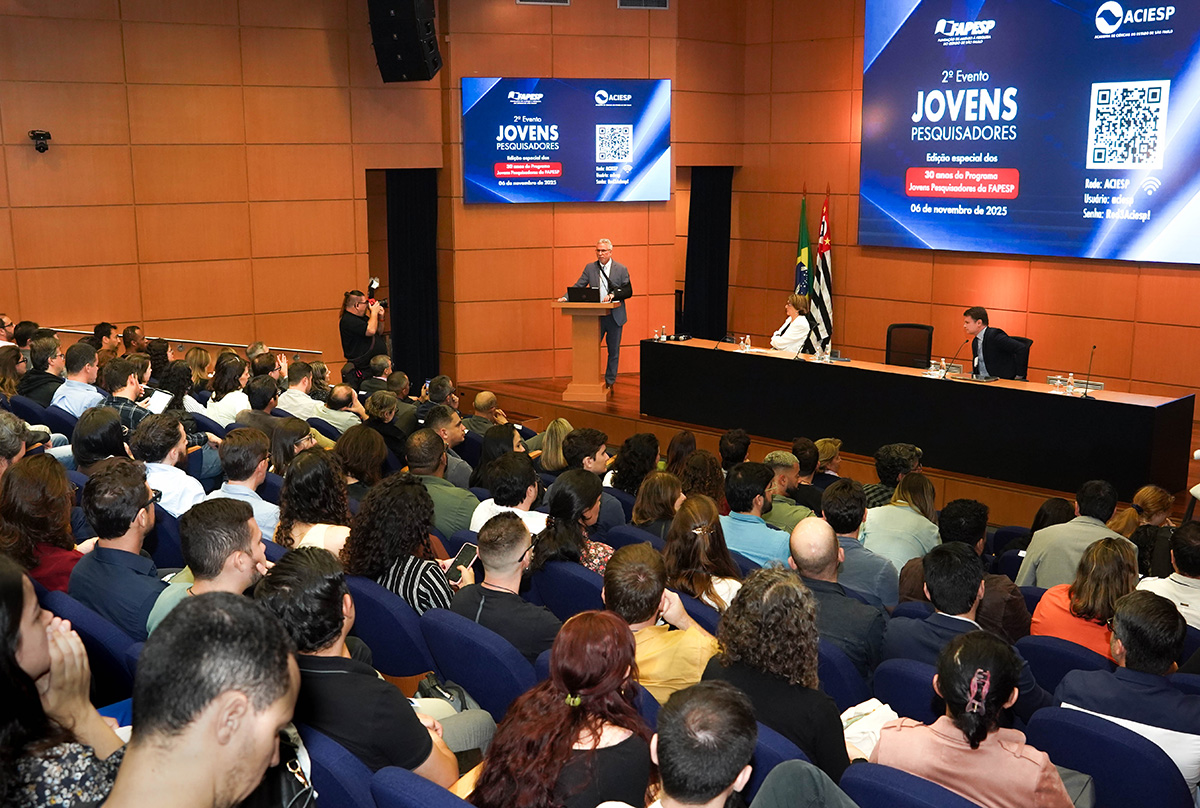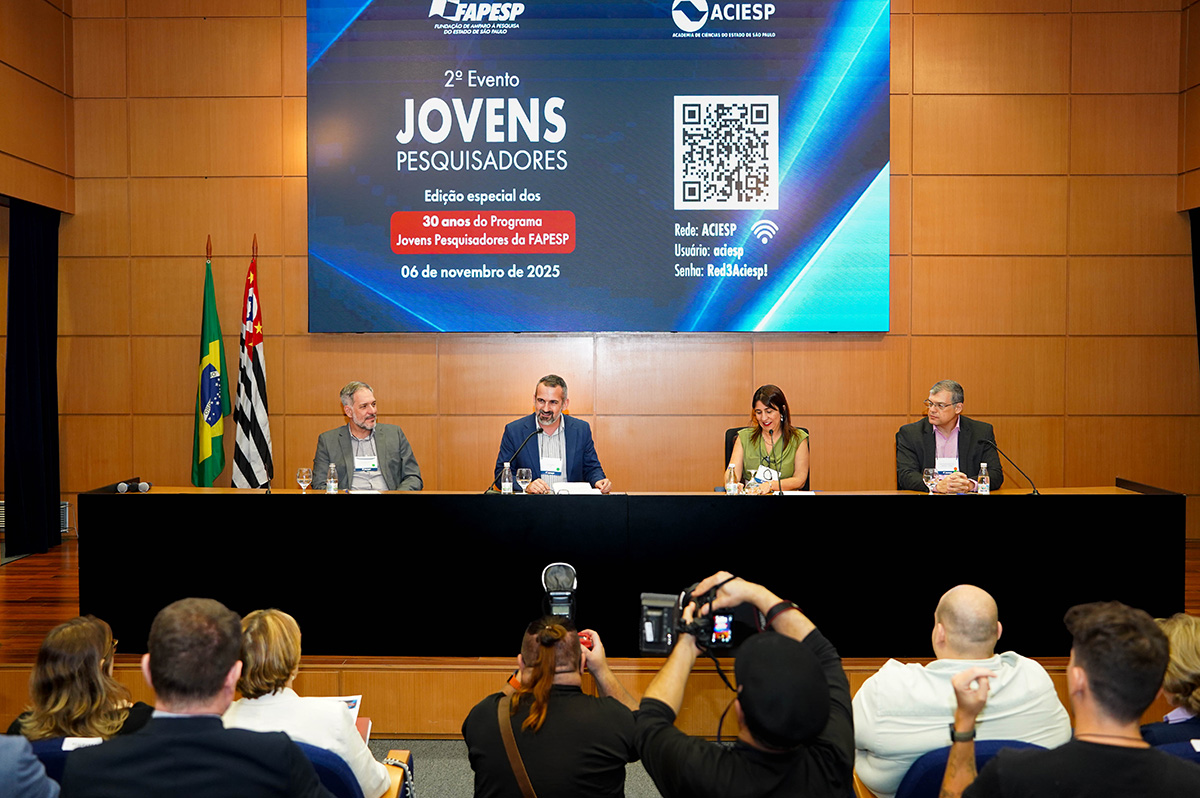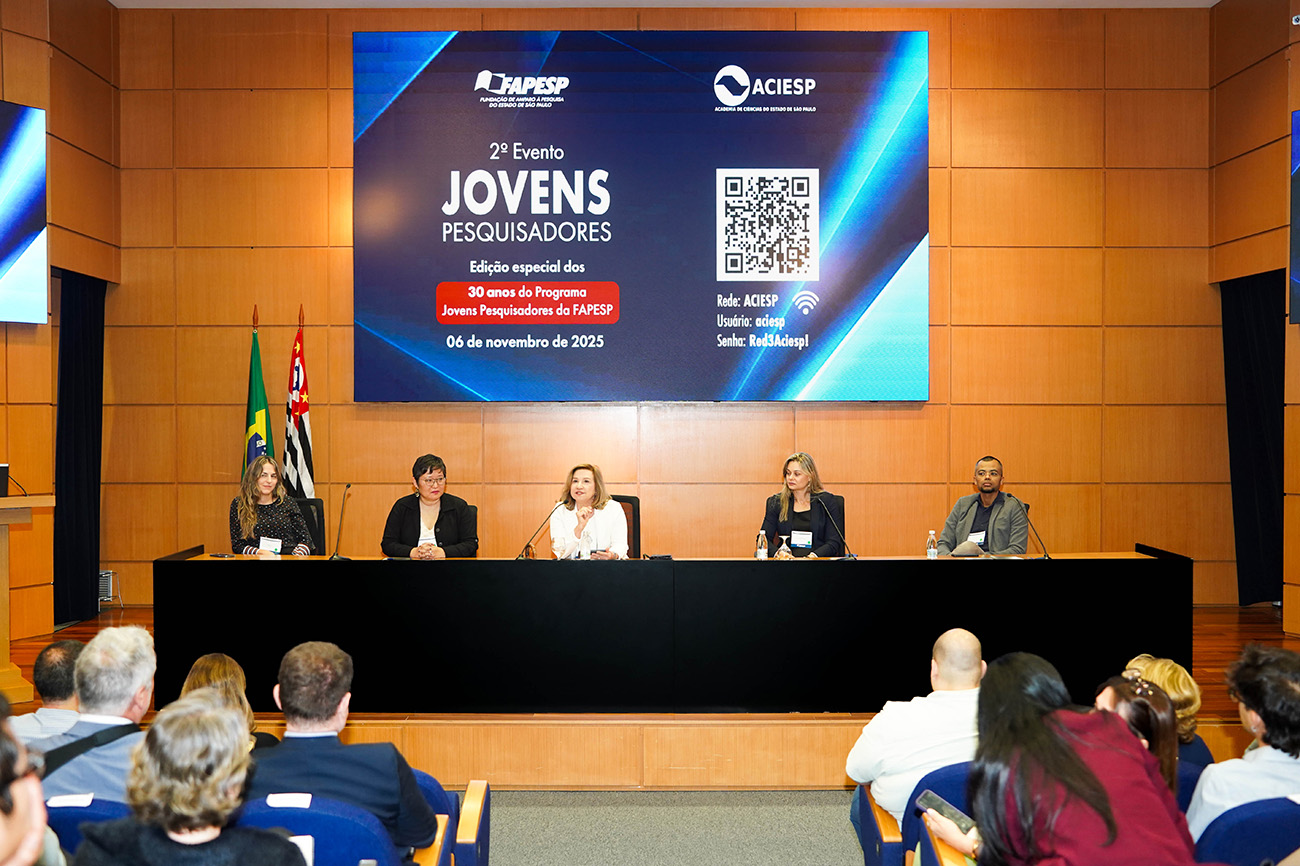

Marcio de Castro, FAPESP’s scientific director; Helena Nader, president of the ABC; and Adriano Andricopulo, president of ACIESP (photo: Daniel Antônio/Agência FAPESP)
A book describing the history of one of the Foundation’s most successful and competitive funding programs was launched on November 6. The event brought together former program beneficiaries who now hold prominent positions in the national research community.
A book describing the history of one of the Foundation’s most successful and competitive funding programs was launched on November 6. The event brought together former program beneficiaries who now hold prominent positions in the national research community.

Marcio de Castro, FAPESP’s scientific director; Helena Nader, president of the ABC; and Adriano Andricopulo, president of ACIESP (photo: Daniel Antônio/Agência FAPESP)
By Karina Toledo | Agência FAPESP – Created to attract and retain scientific talent in the state of São Paulo and decentralize its science and technology system, FAPESP’s Young Investigator Grant (YIG) program celebrates its 30th anniversary this year. Over this period, it has become one of the Foundation’s most successful and competitive funding programs.
Since 1995, the initiative has supported nearly 2,000 scientists experiencing the decisive moment of transition from postdoctoral studies to beginning their careers as independent researchers. The program provides them with the material resources to set up their own laboratories and the autonomy to conduct bold, innovative projects.
The book Jovens Pesquisadores – Uma Ideia que Deu Certo (Young Investigators: An Idea that Worked), launched on November 6 at an event held at FAPESP headquarters, describes part of this history. In addition to providing a brief history of the program, the book features analyses by FAPESP leaders on how the program has strengthened science in São Paulo, as well as testimonials from 35 former beneficiaries who now occupy prominent positions in the national research community.
“The YIG program, as it became known, is an example of a good idea that worked very well. Many of you gathered in the FAPESP auditorium today are proof of this success,” said Marco Antonio Zago, president of the Foundation, in a video presented at the beginning of the event.
The opening ceremony was attended by Marcio de Castro, FAPESP’s scientific director; Helena Nader, the president of the Brazilian Academy of Sciences (ABC), and Adriano Andricopulo, the president of the São Paulo State Academy of Sciences (ACIESP).
In his speech, Castro recalled that the YIG was created in the mid-1990s to address an urgent challenge: ensuring that recent Ph.D. graduates with innovative ideas and creative energy could establish their own lines of research independently in a competitive environment of excellence after returning to Brazil having completed their studies abroad.
“The YIG has contributed to disseminating cutting-edge research, stimulating the creation of new centers of excellence in institutions that previously had little tradition in research. In doing so, FAPESP has helped to reduce regional inequalities and expand São Paulo’s scientific base, diversifying themes, institutions, and perspectives,” said the scientific director.
Castro also presented the results of a study conducted by FAPESP at the request of the Board of Trustees. The study illustrates the impact of the YIG on the careers of its beneficiaries and on São Paulo’s science and technology system. The study compared data from 1,805 researchers who received funding through August 2025 with data from scientists who applied for funding but were denied.
On average, those who received support are between 35 and 40 years old, and approximately 90% work in teaching and research institutions. The main areas are: Health (27.5%), Exact Sciences (22.9%), Biological Sciences (19.2%), Engineering (12.6%), Humanities and Social Sciences (9.3%), and Agricultural Sciences (7.8%). On average, those supported by the program earn 25% more than the group whose projects were denied. Beneficiaries publish 40% more articles on average, and their citations exceed those of non-beneficiaries by 75%.

Dario Zamboni, Gustavo Dalpian, Alessandra Alves de Souza, and Carlos Cerri (photo: Daniel Antônio/Agência FAPESP)
“In times of rapid technological change and unprecedented global challenges, it’s essential to ensure that young scientists continue to find in São Paulo the conditions and incentives necessary to develop original, high-impact ideas. Today, FAPESP renews its commitment to this mission,” said Castro.
The ABC president then recalled that the YIG was inspired by an initiative launched a few years earlier by the University of São Paulo (USP) and conceived by the dean of research at the time, Erney Plessmann de Camargo: the Young Talents Program. Through a call for applications published in the journal Nature in April 1992, USP collected résumés from 400 Brazilian researchers pursuing or having recently completed doctoral degrees with international experience. These researchers could be hired as collaborating professors with the ability to act as research and teaching leaders for a fixed term. About 40 were hired.
“This was a revolution. It was a different way of thinking. So, Erney, wherever you are, not only did what you did work, but years later, FAPESP created a program that’s been here for 30 years. In Brazil, tradition is difficult. And [tradition] that works is even more difficult,” she pointed out.
Nader also pointed out that FAPESP recently created variations of the YIG program that are “more suited to the 21st century,” such as the Generation Program for early-career scientists who are unemployed and the Initial Project Program (Pi) for recent hires at research institutions in the state of São Paulo.

Tathiane Malta, Fabiana Komesu, Margaret de Castro, Lídia Rebolho Arantes, and Rafael Silva Rocha (photo: Daniel Antônio/Agência FAPESP)
Andricopulo, who led a YIG project from 2002 to 2006, said in his speech that the FAPESP program was “a turning point” in his career. He emphasized to today’s young investigators that, more than an individual opportunity, initiatives like this are an invitation to take on collective responsibility at a time when science is needed to address complex issues in areas such as health, climate change, energy, food security, social inclusion, and digital transformation, among others.
“Responsibility to train new generations and build ethical, inclusive, and collaborative research environments. Responsibility to engage in dialogue with society and communicate science clearly. Responsibility to use knowledge not only to advance academic frontiers, but also to improve people’s lives,” he added.
The opening ceremony was followed by two panel discussions that brought together former YIG program beneficiaries. Participants included Gustavo Dalpian (IF-USP), Alessandra Alves de Souza (Agronomic Institute), Carlos Eduardo Pellegrino Cerri (ESALQ-USP), Dario Zamboni (FMRP-USP), Margaret de Castro (FMRP-USP), Fabiana Komesu (IBILCE-UNESP), Lídia Rebolho Arantes (Hospital de Amor), Rafael Silva Rocha (CEO of startup ByMyCell), and Tathiane Malta (FMRP-USP). In front of an audience mainly composed of early-career scientists, the panelists discussed how to build an independent scientific career.
Certification of new ACIESP members
In a ceremony held Thursday morning, also in the FAPESP auditorium, ACIESP certified the 19 new full members elected in 2025, as well as five new affiliate members who will serve a five-year term (2025–2029). The complete list can be found at aciesp.org.br/novos-membros-da-aciesp-eleicao-2025/.
In addition to Marcio de Castro, Helena Nader, and Adriano Andricopulo, the opening of the event was attended by Vahan Agopyan, the Secretary of Science, Technology, and Innovation for the State of São Paulo. In his speech, Agopyan highlighted the importance of showing society that science is essential for development.
“The ABC and ACIESP were created to debate ideas and exercise multidisciplinarity. So, it’s been very good for us, as well as prestigious. But in the 21st century, things are much more complicated, much more complex. Science needs to be heard. But we can’t imagine that it’ll be heard if society doesn’t understand our role,” Agopyan said.
In the secretary’s assessment, FAPESP has contributed to overcoming this challenge through programs such as the Science Centers for Development (SCDs). "They’re demonstrating that if the government has a problem, we can solve it through science. And to my delight, this year’s results were fantastic: 13 secretariats showed interest, exceeding my expectations. It’s a way for politicians to understand what science is for,” he said.
Republish
The Agency FAPESP licenses news via Creative Commons (CC-BY-NC-ND) so that they can be republished free of charge and in a simple way by other digital or printed vehicles. Agência FAPESP must be credited as the source of the content being republished and the name of the reporter (if any) must be attributed. Using the HMTL button below allows compliance with these rules, detailed in Digital Republishing Policy FAPESP.





